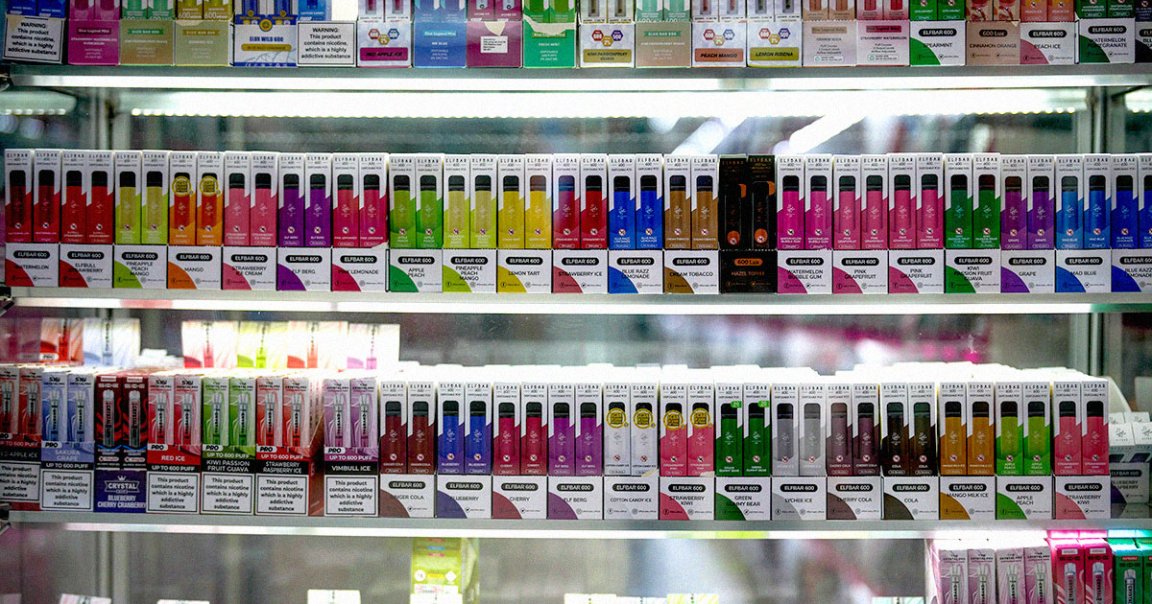
The federal government is facing an uphill battle in its ongoing crackdown on the vaping industry. And some of its efforts, arguably, may be backfiring.
Since 2020, the number of different e-cigarettes being sold in the US has only continued to shoot up, The Associated Press reports, tripling to over 9,000 variants.
That huge volume is reportedly being driven by a surge in popularity of disposable vapes, the vast majority of which are unauthorized variants from manufacturers in China, often peddled by American companies that buy their stock.
That means we have no idea what exactly is in these illegal vapes — or if they’re even safe to consume — but that hasn’t stopped them from being sold at convenience stores and gas stations across the country.
Federal regulators are struggling to keep pace, and some of their woes may be self-inflicted. A glaring loophole excluded disposable vapes from the Food and Drug Administration’s sweeping ban on sweet and fruity vape flavors popular with teens in 2020.
Ever since, underaged vapers have ditched brands like Juul and have turned to cheap disposables, which now make up 40 percent of the $7 billion e-cigarette market, according to data from the analytics firm IRI obtained by the AP.
As of now, over 5,800 unique disposable vape flavors are being sold, the data shows, a whopping 1,500 percent increase from just three years ago.
Clearly, disposables are a soaring market, and a slew of new and shady companies are churning out hundreds of different counterfeit flavors each month.
Ruthless entrepreneurs are also taking advantage of the fact that foreign manufacturers of prefilled disposables are not required to register with the FDA. As such, these upstarts turn to Chinese manufacturers, who charge as low as $2 per vape for bulk sales of 10,000 or more.
“If you have $5 billion you probably can’t start a traditional cigarette company,” Robert Jackler, a professor at the Stanford University School of Medicine, told the AP. “But if you have $50,000 you can just send your artwork and logo to one of these companies and it will be on a pallet next week.”
IRI data shows that one Texas-based brand called Pastel Cartel made more than $240 million from disposable vapes before the FDA banned its Chinese imports, though the brand has appealed this decision.
To add to the heap of health concerns surrounding vapes, how safe these imported disposables are is anyone’s guess. Though the FDA has the authority to inspect foreign manufacturers, it rarely exercises this power, with only two Chinese vape manufacturers having been inspected by the FDA so far, according to the report.
As of now, the regulator has blocked imports of Elf Bar, Esco Bar, and Breeze, from China. However, IRI data indicates that this trio made up only 14 percent of disposables sold last year.
Still, American vape companies and manufacturers are far from blameless. Anti-vaping groups have pointed out that vapes sold by Vuse, owned by the Reynolds American tobacco company, were the second most popular with teens last year.
“They want groups like ours to call for a ban on all Chinese vapes so that they can take over the market,” Dorian Fuhrman, co-founder of Parents Against Vaping E-cigarettes, told the AP.
“We’re not calling for that,” she added. “We’re calling on the FDA to do its job.”
More on vaping: Feds Cracking Down on Vaping Companies for “Breaking the Law”